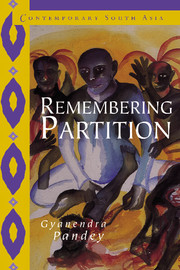Book contents
- Frontmatter
- Contents
- Acknowledgments
- List of abbreviations
- 1 By way of introduction
- 2 The three partitions of 1947
- 3 Historians' history
- 4 The evidence of the historian
- 5 Folding the local into the national: Garhmukhteshwar, November 1946
- 6 Folding the national into the local: Delhi 1947–1948
- 7 Disciplining difference
- 8 Constructing community
- Select bibliography
- Index
3 - Historians' history
Published online by Cambridge University Press: 06 January 2010
- Frontmatter
- Contents
- Acknowledgments
- List of abbreviations
- 1 By way of introduction
- 2 The three partitions of 1947
- 3 Historians' history
- 4 The evidence of the historian
- 5 Folding the local into the national: Garhmukhteshwar, November 1946
- 6 Folding the national into the local: Delhi 1947–1948
- 7 Disciplining difference
- 8 Constructing community
- Select bibliography
- Index
Summary
Historians' history works, I suggest, to produce the ‘truth’ of the traumatic, genocidal violence of Partition and to elide it at the same time. Several different techniques are employed.
One is to declare such violence non-narratable: the ‘limit case’ of history, as it has been described in the instance of the Holocaust. The problem is that of the peculiar individuation of these ‘uniquely unique’ events, a leading philosopher has declared. ‘Victimization is the other side of history that no cunning of reason can ever justify’, writes Ricouer, reflecting on the theme of tremendum horrendum in our experience of the past. ‘Every other form of individuation is the counterpart to a work of explanation that connects things together. But horror isolates events by making them incomparable, incomparably unique, uniquely unique.’
It is possible to suggest that all societies have their own limit cases. The Nazi Holocaust occupies this place in a very wide range of European and American scholarship. For many Indian scholars, on the other hand, that unbelievable violence is still historicisable, organised as it is by the state – a factor that is said to allow for comparison and explanation. Partition is, in this perspective, even more ‘unhistorical’ and inexplicable than the Holocaust. For this was not industrialised slaughter, directed from a distance, but a hand-to-hand, face-to-face destruction, frequently involving neighbour against neighbour. Its sites were more random. Its archives are more dispersed and imprecise.
- Type
- Chapter
- Information
- Remembering PartitionViolence, Nationalism and History in India, pp. 45 - 66Publisher: Cambridge University PressPrint publication year: 2001
- 1
- Cited by

